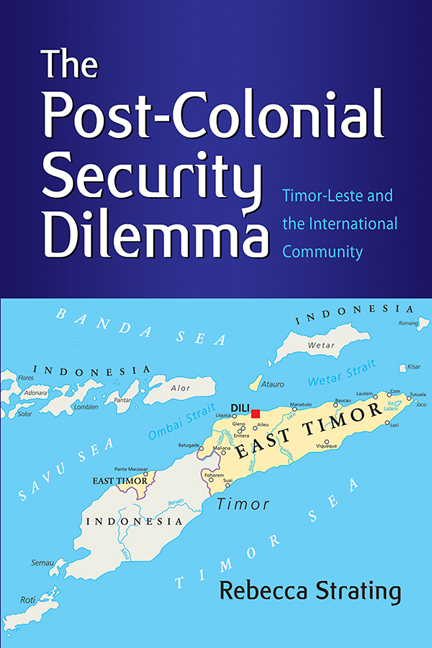Book contents
- Frontmatter
- Contents
- List of Tables
- Acknowledgements
- 1 Introduction
- 2 The Struggle for Recognition: Territorialization, Self-determination and the Imagining of “East Timor”
- 3 The Politics of Recognition: East Timor and the International Community
- 4 Establishing Legitimacy: International State-building in East Timor
- 5 Timor-Leste's Aspirational Foreign Policy
- 6 Identity Hedging: Timor-Leste's Engagement with Intergovernmental Organizations
- 7 Timor-Leste's National Security Agenda
- 8 Securing Economic Sovereignty
- 9 International Reconciliation and Transitional Justice
- 10 Conclusion: Timor-Leste in the Changing Regional Order
- Postscript
- Bibliography
- Index
- About the Author
8 - Securing Economic Sovereignty
Published online by Cambridge University Press: 16 May 2019
- Frontmatter
- Contents
- List of Tables
- Acknowledgements
- 1 Introduction
- 2 The Struggle for Recognition: Territorialization, Self-determination and the Imagining of “East Timor”
- 3 The Politics of Recognition: East Timor and the International Community
- 4 Establishing Legitimacy: International State-building in East Timor
- 5 Timor-Leste's Aspirational Foreign Policy
- 6 Identity Hedging: Timor-Leste's Engagement with Intergovernmental Organizations
- 7 Timor-Leste's National Security Agenda
- 8 Securing Economic Sovereignty
- 9 International Reconciliation and Transitional Justice
- 10 Conclusion: Timor-Leste in the Changing Regional Order
- Postscript
- Bibliography
- Index
- About the Author
Summary
The central contention of this book is that Timor-Leste's leaders promote an absolute external sovereignty concept that views selfdetermination and a lack of reliance upon other actors in the international community as central to effective statehood. As the previous chapter examined, the “security-development nexus” reflects the mutually-reinforcing relationship between conflict management, and economic and institutional development. According to José Ramos-Horta, Timor-Leste is “keenly aware of the link between security, stability and poverty reduction”. The capacities of state governments to deliver key services to citizens are “essential” for managing conflict, and internal security conditions influence the capacities of states to promote economic development. While the previous chapter highlighted the security dimensions of effective statehood, this chapter examines the use of foreign policy by Timorese governments to advance their economic ambitions to secure empirical sovereignty by consolidating their governmental capacities.
As a self-identified fragile state, Timor-Leste's ability to enact its vision of sovereignty relies upon its medium- and long-term development and resource allocation plans, and its economic relations with other actors in the global economy. Timor-Leste's leaders recognized during the independence movement that Timor-Leste's economic independence would rely upon the oil and gas reserves in the Timor Sea, a body of water separating the coastlines of the island of Timor and Australia by less than 400 nautical miles. Since 2007, Timor-Leste has experienced high rates of economic growth and associated gains in socioeconomic development indicators due to joint oil and gas development with Australia. This has enabled Timor-Leste's political leaders to present the state as a fragile state “success story” (see chapter four). Timor- Leste's representatives, including Xanana Gusmão, promote these finite resources as the centrepiece of its ambitious economic plans. The 2011 Strategic Development Plan (SDP) articulated aspirations of turning Timor-Leste into an upper-middle income state by 2030. This goal forms an important part of its aspirational foreign policy.
Timor-Leste's biggest economic challenge has also constituted its biggest foreign policy challenge: since 2002, the issue of who “owns” the resources in the Timor Sea has complicated bilateral relations between Timor-Leste and Australia. Maritime resources are inherently tied up with Timor-Leste's economic viability and internal sovereign capabilities as oil revenues have provided over 90 per cent of government revenue, rendering the state as central to wealth production and the allocation of scarce economic resources.
- Type
- Chapter
- Information
- The Post-Colonial Security DilemmaTimor-Leste and the International Community, pp. 235 - 271Publisher: ISEAS–Yusof Ishak InstitutePrint publication year: 2018

